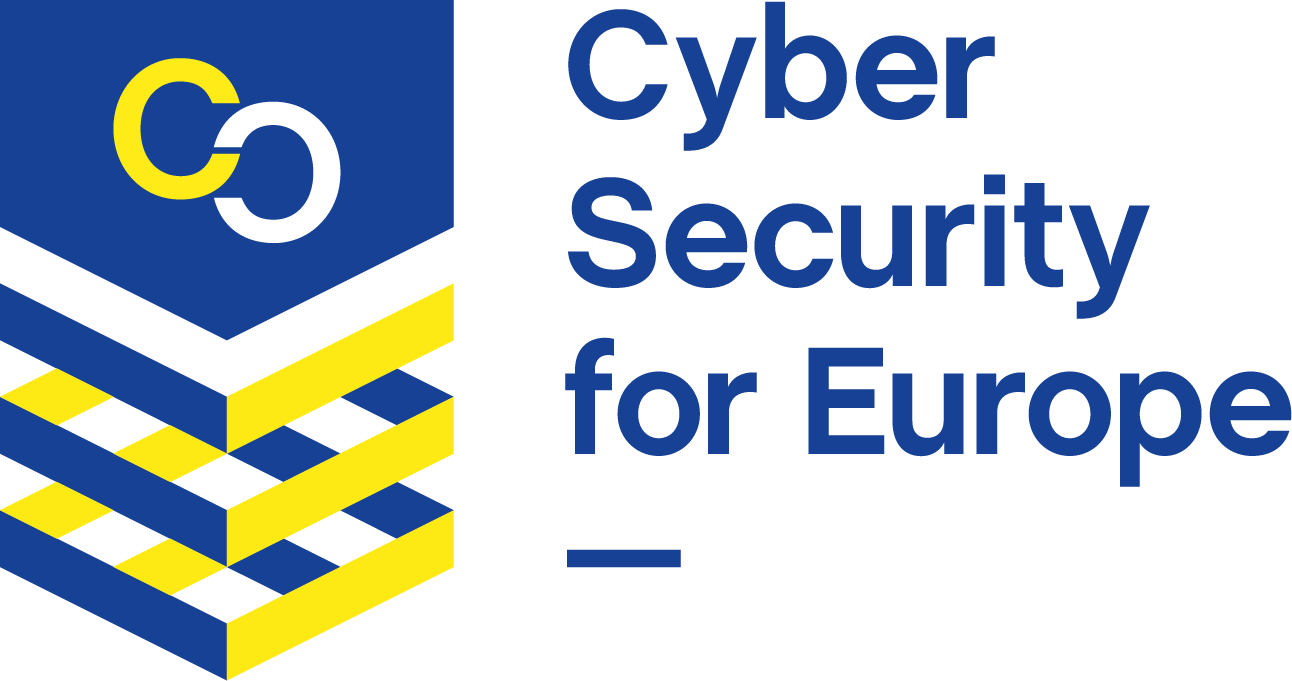CyberSec Lab: UM is a multidisciplinary team of researchers, developers and consultants who design, develop and evaluate cybersecurity solutions and services. Our activities are aimed at promoting and facilitating the use of appropriate security and protection mechanisms related to ICT technology.
Our mission is to raise the level of information/cybersecurity, awareness of privacy and data protection, and to provide state-of-the-art knowledge and know-how enriched with good practices.
Projekti
-
CyberSec4Europe - Cybersecurity for Europe, Horizon 2020 project, 2019 - 2022
 In February 2019, as a part of the Horizon 2020 program, the CyberSec4Europe project was launched. The main objective of the project is to establish and operate a pilot for a Cybersecurity Competence Network with the aim to strengthen research and deepen cooperation in the field of cyber security in the EU. Part of the project consortium with 43 partners from 22 EU Member States and associated countries is also the Laboratory of Data Technologies, Institute of Informatics, Faculty of Electrical Engineering and Computer Science, University of Maribor. CyberSec4Europe has been selected as one of four projects to establish and operate a pilot for a Cybersecurity Competence Network and to develop and implement a common cybersecurity research and innovation roadmap.
With its goal to boost the effectiveness of the Security Union, the EU wishes to ensure that it retains and develops essential capacities to secure its digital economy, infrastructures, society and democracy. The EU has recognised that cybersecurity research, competences and investments are spread across Europe with too little alignment, and that there is an urgent need to step up investment in technological advancements that could make the Digital Single Market more cybersecure and overcome the fragmentation of the EU research capacities. The projects will pilot and demonstrate the possibilities of operating and managing a network of competence centres through the use of good practices resulting from the expertise of the project partners.
In February 2019, as a part of the Horizon 2020 program, the CyberSec4Europe project was launched. The main objective of the project is to establish and operate a pilot for a Cybersecurity Competence Network with the aim to strengthen research and deepen cooperation in the field of cyber security in the EU. Part of the project consortium with 43 partners from 22 EU Member States and associated countries is also the Laboratory of Data Technologies, Institute of Informatics, Faculty of Electrical Engineering and Computer Science, University of Maribor. CyberSec4Europe has been selected as one of four projects to establish and operate a pilot for a Cybersecurity Competence Network and to develop and implement a common cybersecurity research and innovation roadmap.
With its goal to boost the effectiveness of the Security Union, the EU wishes to ensure that it retains and develops essential capacities to secure its digital economy, infrastructures, society and democracy. The EU has recognised that cybersecurity research, competences and investments are spread across Europe with too little alignment, and that there is an urgent need to step up investment in technological advancements that could make the Digital Single Market more cybersecure and overcome the fragmentation of the EU research capacities. The projects will pilot and demonstrate the possibilities of operating and managing a network of competence centres through the use of good practices resulting from the expertise of the project partners. -
CONCORDIA - Cyber Security Competence for Research and Innovation, Horizon 2020 project, 2019 - 2022
 CONCORDIA is a major H2020 consortium to interconnect Europe’s Cybersecurity capabilities. It will establish a pilot for a Cybersecurity Competence Network and will lead the development of a common Cybersecurity Research & Innovation Roadmap for Europe.
A dedicated EU-wide consortium involving prominent industry, academia, SMEs and especially national cyber security centers launches the H2020 project CONCORDIA (Cyber Security Competence for Re-search and Innovation). CONCORDIA will pilot an EU Cybersecurity Competence Network to provide technological, societal and policy leadership for Europe. CONCORDIA aims to implement a common Cybersecurity Research & Innovation Roadmap for Europe.
CONCORDIA is a four-year multi-disciplinary research and innovation project, and will play a leadership role in boosting the effectiveness of EU’s security union. The project, started in January 2019, is coordinated by the Research Institute CODE from the Bundeswehr University Munich and involves 46 partners in total. “With CONCORDIA we are integrating cybersecurity competences to enhance Europe's digital sovereignty”, said Prof. Gabi Dreo (who received her Bachelor’s degree at the Faculty of Electrical Engineering and Computer Science at the University of Maribor), executive director of CODE. The consortium includes 23 partners from industry and other organizations, and 23 partners from academia.
CONCORDIA is a major H2020 consortium to interconnect Europe’s Cybersecurity capabilities. It will establish a pilot for a Cybersecurity Competence Network and will lead the development of a common Cybersecurity Research & Innovation Roadmap for Europe.
A dedicated EU-wide consortium involving prominent industry, academia, SMEs and especially national cyber security centers launches the H2020 project CONCORDIA (Cyber Security Competence for Re-search and Innovation). CONCORDIA will pilot an EU Cybersecurity Competence Network to provide technological, societal and policy leadership for Europe. CONCORDIA aims to implement a common Cybersecurity Research & Innovation Roadmap for Europe.
CONCORDIA is a four-year multi-disciplinary research and innovation project, and will play a leadership role in boosting the effectiveness of EU’s security union. The project, started in January 2019, is coordinated by the Research Institute CODE from the Bundeswehr University Munich and involves 46 partners in total. “With CONCORDIA we are integrating cybersecurity competences to enhance Europe's digital sovereignty”, said Prof. Gabi Dreo (who received her Bachelor’s degree at the Faculty of Electrical Engineering and Computer Science at the University of Maribor), executive director of CODE. The consortium includes 23 partners from industry and other organizations, and 23 partners from academia. -
An analysis of models predicting privacy and self-disclosure on social networks, bilateral project with the School of Information Sciences, University of Pittsburgh, Pittsburgh, USA, 2019 - 2021
In the scope of the project, a literature review and analysis will be done with the aim of identification and evaluation of factors, which have an effect on disclosure and comprehension of privacy. An objective of the proposed project is to discover possible effects on disclosure of personal information on social networking sites and effects on users’ comprehension of privacy. There are many possibilities for development of new research contents in the field of social networking sites and the proposed project could help to better understand users while they are using social networking sites and could have an effect on following research. Based on the results recommendations for raising awareness and information security will be formed.
-
Privacy-preserving Distributed Data Processing for IoT applications, bilateral project with the School of Information Sciences, University of Pittsburgh, Pittsburgh, ZDA, 2018 - 2019
In this project, we aim at addressing some of the key challenges of secure and privacy-preserving processing of distributed data in IoT systems. The proposed effort will conduct an analysis of the current state of the art, an analysis of the relative merits and demerits of potential candidate solutions in terms of performance efficiency, security and privacy guarantees and usability. In particular, the study will focus on a novel application of two classical private query processing techniques namely (i) differential privacy and (ii) query processing over encrypted data. In contrast to traditional methods, the proposed approach aims to develop a unique combination of differential privacy with encryption-based private data processing in order to achieve a fine tradeoff between the overhead of data processing and the level of security/privacy guaranteed by the scheme.
-
Security of multi-agent systems, bilateral project with the Univerzitet u Novom Sadu, Fakulteta tehničkih nauka, Novi Sad, Srbija, 2016 - 2017
Software agents are executable software entities which are characterized by autonomous behaviour, interaction with other agents, reactivity to environmental changes, and the ability to take the initiative and express goal-directed behaviour. As agent perform different tasks and are situated in different environments, there are several parts in which security plays and important role: message exchange, agent mobility and agent framework signalling. These three main aspects need adequate security measures. Messages between agents should be encrypted and signed. When an agent moves from one node to another, the agent source code and the internal state are transferred. In both cases the data has to be encrypted and signed. All types of messages exchanged between agent frameworks also have to be protected meaning that cryptography has to be applied. The goal and main contribution of the project would include building an infrastructure for the secure agent framework which would address the security issues raised.
-
Security Issues of Data Analysis, bilateral project with the School of Information Sciences, University of Pittsburgh, Pittsburgh, ZDA, 2015 - 2016
The project aims to address the security issues of data analysis, more specifically possibilities of data protections with means of cryptography. The analysis of the current state of research has to be conducted, followed by a critical review of proposed data protection methods, their benefits and drawbacks. Based on the finding, guidelines, technologies or best practices of data protection in data analysis would be developed. Performance plays an important role when security measures are applied and this has to be considered. In this sense the combined research experience and efforts of both partners in the project will provide a fundament for exchange of ideas and research results of the participating institutions and will enable both partners to facilitate the development of new findings as well as better understanding of both research topics and their matching.
Theses
3rd Cycle Bologna Doctoral Study Programme: Computer Science and Informatics – PhD Theses
- KOMPARA, Marko. Protokol za overjanje in dogovor o ključu za uporabo v brezžičnih telesnih senzorskih omrežjih, 2019
- TURKANOVIĆ, Muhamed. Protokoli za overjanje in dogovor o ključu za neinfrastrukturna omrežja, prilagojeni konceptu interneta stvari, 2016
- KEŽMAH, Boštjan. Zasnova protokola za pošteno elektronsko vročanje z zanesljivim potrdilom o poslani elektronski pošiljki, 2016
2nd Cycle Bologna Master’s Study Programme: Informatics and Technologies of Communication –
Master Theses
- KRAJNC, Jan. Analiza in primerjava hitrosti algoritmov za zagotavljanje celovitosti, 2020
- VIDRIH, Nejc. Varnostni vidiki sistemov za avtomatizacijo doma, 2020
- JERENKO, Tomi. Analiza hitrosti simetričnih bločnih šifrirnih algoritmov, 2019
- MATJAŠEC, Matjaž. Metode biometričnega overjanja: sistematičen pregled literature, 2018
- VLAHEK, Dino. Problem kvantnih računalnikov v kriptografiji in post-kvantna kriptografija, 2018
- MARKOVIĆ, Sašo. Spletna platforma za vizualizacijo kriptografskega koncepta celovitosti, 2018
- KONEČNIK, Matic. Tehnologije za zagotavljanje anonimnosti na internetu, 2018
- ANŽELJ, Sergej. Implementacijski vidiki protokolov za overjanje in izmenjavo ključev, 2017
- VEZJAK, Klemen. Iskanje prijavnih podatkov preko nezavarovanih povezav, 2017
- ŽOLEK, Matija. Spletna aplikacija za varno sporočanje, 2017
- HRGAREK, Luka. Zbiranje podatkov in profiliranje uporabniških naprav s pomočjo spletnih brskalnikov, 2017
- DREVENŠEK, Aleks. Izčrpno iskanje ključa s pomočjo računalništva v oblaku, 2016
- HERIČKO, Matija. Klasifikacija varnostnih zahtev za overitvene protokole – sistematičen pregled literature, 2015
- URŠNIK, Andrej. Zaupanje v ponudnike programske opreme za mobilne naprave, 2014
- PRAH, Rok. Zavedanje uporabnikov mobilnih naprav o zbiranju in posredovanju podatkov, 2014
- FLISAR, Jernej. Varovanje podatkov v oblačni storitvi Dropbox, 2012
- BERANIČ, Tina. Vidiki zaupanja uporabnikov ob uporabi storitev mobilnega plačevanja, 2012
1st Cycle Bologna Higher-Education Academic Study Programme: Informatics and Technologies of Communication – BSc Theses
- ŽOLGER, David. Analysis of HTTPS protocol prevalence, 2020
- BOBOVNIK, Denis. Analiza vsebin na temnem spletu, 2020
- ŠKRINJAR, Gregor. Analiza Googlovega sistema za prijavo, 2020
- KOREN, Matic. Primerjava varnostnih svežnjev protokola TLS, 2020
- SAHERNIK, David. Varnost naprav IoT na podlagi testnega okolja s pomočjo Aruba ClearPass, 2020
- TALEVSKA, Emilija. Zaupanje uporabnikov v oblačne storitve, 2020
- KOREN, Marcel. Delovanje, snovanje in uporaba sodobnih metod CAPTCHA, 2020
- ČRNKO, Tadej. Implementacija napadov na protokol TLS/SSL, 2020
- GORNIK, Pina. Sodobni načini varnega shranjevanja gesel, 2020
- PERŠA, Tomi. Spletna platforma za izzive razkrivanja klasičnih šifer, 2019
- JAKOPIČ, Matjaž. Analiza varnosti omrežij WiFi v Mariboru, 2018
- TKALČIČ, Dominika. IP-naslov kot osebni podatek: kaj razkrije o posamezniku, 2018
- VRECL, Žanina. Ozaveščenost uporabnikov družbenega omrežja Facebook o spletnem ribarjenju, 2018
- GROBELNIK, Matej. Napad na grafična gesla z grobo silo in slovarjem, 2017
- PEČNIK, Špela. Analiza javno dostopnih osebnih podatkov na internetu, 2017
- ŠPINDLER, Anja. Mobilna in spletna aplikacija za varno upravljanje z gesli, 2017
- VODIŠEK, Denis. Profiliranje in sledenje uporabnikom na spletu, 2017
- FAJS, Mihael. Spletna platforma za vizualizacijo delovanja elektronskega podpisa, 2017
- SLATINEK, Mark. Varen in anonimen spletni sporočilni sistem, 2017
- PERNOUŠEK, Luka. Aplikacija za varno sporočanje na platformi iOS, 2016
- KOVAČEVIČ, Adel. Delovanje varnostnega protokola TLS/SSL in napadi nanj, 2016
- MERČNIK, Tamara. Varnost podatkov pri uporabi aplikacij na družbenem omrežju Facebook, 2016
- KUZMAN, Aljaž. Možnosti celovitega varovanja zasebnosti pri uporabi interneta in uhajanje podatkov – analiza mobilne platforme Android, 2015
- VAJDA, Tadej. Možnosti celovitega varovanja zasebnosti pri uporabi interneta in uhajanje podatkov – analiza namiznega računalnika, 2015.
- ŽERDONER, Darian. Pajek za iskanje nastavitev zasebnosti na družabnem omrežju Facebook, 2014
- ŽOLEK, Matija. Spletna aplikacija za preverjanje nastavitev zasebnosti na Facebooku, 2013
- KELEMEN, Miha. Stopnja zaščite profilov Facebook, 2013
- ŽOVE, Jure. Mobilna aplikacija za šifriranje osebnih multimedijskih vsebin, 2012
- JAUŠOVEC, Anja. Zasebnost na spletu in njen vpliv na zaposlovanje, 2012
- PUŠNIK, Irena. Mobilna aplikacija za upravljanje z gesli, 2011
- MATJAŠEC, Matjaž. Načini overjanja digitalnih potrdil, 2011
- BERANIČ, Tina. Vpeljava varnostne politike v srednje velikem podjetju, 2010
1st Cycle Bologna Higher-Education Professional Study Programme: Informatics and Technologies of Communication – BSc Theses
- IVAČIČ, Tomaž. Šifrirni algoritmi v tehnologiji veriženja blokov, 2019
- VOZLIČ, Darko. Zagotavljanje revizijske sledi v podatkovnem skladišču, 2019
- ŠACER, Franci. Izogibanje protivirusni zaščiti, 2018
- JAHIĆ, Alem. Kibernetska kriminaliteta in zaščita uporabnikov, 2018
- KOLAC, Sašo. Upravljanje pooblastil za dostop do storitev in podatkov v oblaku, 2018
- ŠPALIR, Dušan. Izdelava naprednega programa za frekvenčno analizo besedil, 2017
- KRAJNC, Jure. Uporaba orodja za odkrivanje javno dostopnih gesel, 2017
- CASAR, Aleš. Zagotavljanje in analiza varnosti sistema za upravljanje vsebin WordPress, 2017
- AGOVIĆ, Elvin. Zloraba plačilnih in kreditnih kartic, 2017
- JAGAR, Veronika. Najpogosteje uporabljane tehnike socialnega inženiringa za napad na informacijske sisteme, 2015
- ISMAILI, Rejhan. Primerjava tehnologij za sledenje uporabnikom spletnih strani, 2015
- SKAZA, Tomaž. Upravljanje neprekinjenega poslovanja it v podjetju BSH Hišni aparati d.o.o., 2015
- KOROŠEC, Danijel. Varnost in zaščita v brezžičnih omrežjih, 2015
- KUJAVEC, Robert. Zagotavljanje varnosti podatkov na pametnih mobilnih telefonih, 2015
- FEKONJA, Samo. Sistem upravljanja varovanja informacij kot del sistema vodenja podjetja Dravske elektrarne Maribor D.O.O., 2014
- VEZJAK, Klemen. Spletni varnostni protokoli, 2013
- MAKARI, Tadej. Zagotavljanje zaupnosti elektronskih sporočil, 2013
- ŠTOK, Aleš. Varnost spletnih plačil, 2012
- JUREŠ, Uroš. Varstvo osebnih podatkov v sistemih za množično pošiljanje elektronske pošte, 2012
- GORIČANEC, Miha. Biometrične zaščitne naprave, 2011
- KOVAČ, Damjan. Varnost operacijskega sistema Windows in brezžičnih povezav, 2010
- RUTNIK, Dušan. Varovanje XML dokumentov z uporabo elektronskega podpisa in šifriranja, 2010
1st Cycle Bologna Higher-Education Professional Study Programme: Information Security,
Faculty of Criminal Justice, University of Maribor – BSc Theses
- KRALJ, Gašper. Varnost internetnega bančništva v NLB : diplomsko delo visokošolskega strokovnega študija Varstvoslovje, 2016
- MIHOLIČ, Saša. Zlorabe pri elektronskem poslovanju in zaščita pred njimi : diplomsko delo visokošolskega strokovnega študija Informacijska varnost, 2015
- KEK, Frančišek Vid. Varno brisanje digitalnih podatkov : diplomsko delo visokošolskega strokovnega študija Informacijska varnost, 2015
- KUJAVEC, Robert. Zagotavljanje varnosti podatkov na pametnih mobilnih telefonih : diplomsko delo visokošolskega strokovnega študija Informacijska varnost, 2015
- ŽUŽEK, Jaka. Zaznavanje napadov z detekcijskim sistemom Honeypot : diplomsko delo visokošolskega strokovnega študija Informacijska varnost, 2015
Publications
- BOŠNJAK, Leon, BRUMEN, Boštjan. Shoulder surfing experiments : a systematic literature review. Computers & security, ISSN 0167-4048. [Print ed.], Dec. 2020, vol. 99, str. 1-34, doi: 10.1016/j.cose.2020.102023.
- NEMEC ZLATOLAS, Lili, WELZER-DRUŽOVEC, Tatjana, HÖLBL, Marko, HERIČKO, Marjan, KAMIŠALIĆ, Aida. A model of perception of privacy, trust, and self-disclosure on online social networks. Entropy, ISSN 1099-4300, Published: 7 August 2019, str. 1-17, doi: 10.3390/e21080772.
- TANESKI, Viktor, HERIČKO, Marjan, BRUMEN, Boštjan. Systematic overview of password security problems. Acta polytechnica Hungarica. 2019, vol. 16, no. 3, str. 143-165. ISSN 1785-8860.
- BOŠNJAK, Leon, BRUMEN, Boštjan. Shoulder surfing: from an experimental study to a comparative framework. International journal of human-computer studies, ISSN 1071-5819. [Print ed.], Oct. 2019, vol. 130, str. 1-20, doi: 10.1016/j.ijhcs.2019.04.003.
- BOŠNJAK, Leon, BRUMEN, Boštjan. Rejecting the death of passwords: advice for the future. Computer science and information systems, ISSN 1820-0214. [Print ed.], jan. 2019, vol. 16, iss. 1, str. 313-332, doi: 10.2298/CSIS180328016B.
- KOMPARA, Marko, ISLAM, SK Hafizul, HÖLBL, Marko. A robust and efficient mutual authentication and key agreement scheme with untraceability for WBANs. Computer networks : the international journal of computer and telecommunications networking, ISSN 1389-1286. [Print ed.], jan. 2019, vol. 148, pp. 196-213, doi: 10.1016/j.comnet.2018.11.016.
- KOMPARA, Marko, KUMARI, Saru, HÖLBL, Marko. Analysis and improvement of a secure key management protocol for e-health applications. Computers & electrical engineering, ISSN 0045-7906, Jan. 2019, vol. 73, pp. 97-113, doi: 10.1016/j.compeleceng.2018.11.007.
- HÖLBL, Marko, KOMPARA, Marko, KAMIŠALIĆ, Aida, NEMEC ZLATOLAS, Lili. A systematic review of the use of blockchain in healthcare. Symmetry, ISSN 2073-8994, 2018, vol. 10, iss. 10, pp. 1-22, doi: 10.3390/sym10100470.
- KOMPARA, Marko, HÖLBL, Marko. Survey on security in intra-body area network communication. Ad hoc networks, ISSN 1570-8705, March 2018, vol. 70, pp. 23-43, doi: 10.1016/j.adhoc.2017.11.006.
- NEMEC ZLATOLAS, Lili, HERIČKO, Marjan, WELZER-DRUŽOVEC, Tatjana, HÖLBL, Marko. Models of privacy and security issues on mobile applications. V: PELET, Jean-Éric. Mobile platforms, design, and apps for social commerce. Hershey (Pa.): IGI Global. cop. 2017, pp. 84-105, doi: 10.4018/978-1-5225-2469-4.ch006.
- HÖLBL, Marko, WELZER-DRUŽOVEC, Tatjana, NEMEC ZLATOLAS, Lili. Security and privacy related issues in the internet of things. V: WELZER-DRUŽOVEC, Tatjana (ur.), et al. Information modelling and knowledge bases XXVII, (Frontiers in artificial intelligence and applications, ISSN 0922-6389, vol. 280). Amsterdam; Berlin; Washington (DC): IOS Press. cop. 2016, pp. 321-326.
- SABZINEJAD FARASH, Mohammad, TURKANOVIĆ, Muhamed, KUMARI, Saru, HÖLBL, Marko. An efficient user authentication and key agreement scheme for heterogeneous wireless sensor network tailored for the Internet of Things environment. Ad hoc networks, ISSN 1570-8705, Jan. 2016, vol. 36, part 1, pp. 152-176, doi: 10.1016/j.adhoc.2015.05.014.
- NEMEC ZLATOLAS, Lili, WELZER-DRUŽOVEC, Tatjana, HERIČKO, Marjan, HÖLBL, Marko. Privacy antecedents for SNS self-disclosure : the case of Facebook. Computers in human behavior, ISSN 0747-5632. [Print ed.], April 2015, vol. 45, pp. 158-167, doi: 10.1016/j.chb.2014.12.012.
- GROSS, Hannes, HÖLBL, Marko, SLAMANIG, Daniel, SPREITZER, Raphael. Privacy-aware authentication in the internet of things. V: REITER, Michael (ur.), NACCACHE, David (ur.). Cryptology and network security : proceedings, (Lecture notes in computer science, ISSN 0302-9743, 9476). Heidelberg; Dordrecht; London; New York: Springer. cop. 2015, pp. 32-39.
- TURKANOVIĆ, Muhamed, BRUMEN, Boštjan, HÖLBL, Marko. A novel user authentication and key agreement scheme for heterogeneous ad-hoc wireless sensor networks, based on the Internet of Things notion. Ad hoc networks, ISSN 1570-8705, 2014, vol. 20, pp. 96-112, doi: 10.1016/j.adhoc.2014.03.009.
- TURKANOVIĆ, Muhamed, HÖLBL, Marko. The (in)adequacy of applicative use of quantum cryptography in wireless sensor networks. Quantum information processing, ISSN 1570-0755, Oct. 2014, vol. 13, iss. 10, pp. 2255-2275, doi: 10.1007/s11128-014-0769-z.
- TURKANOVIĆ, Muhamed, HÖLBL, Marko. Notes on “A temporal-credential-based mutual authentication and key agreement scheme for wireless sensor networks”. Wireless personal communications, ISSN 0929-6212, Jul. 2014, vol. 77, iss. 2, pp. 907-922, doi: 10.1007/s11277-013-1543-8.
- BRUMEN, Boštjan, HERIČKO, Marjan, ROZMAN, Ivan, HÖLBL, Marko. Security analysis and improvements to the psychopass method. Journal of medical internet research : JMIR, ISSN 1438-8871, 2013, vol. 15, iss. 8, pp. 1-7. https://dk.um.si/IzpisGradiva.php?id=67103, doi: 10.2196/jmir.2366.
- BRUMEN, Boštjan, HERIČKO, Marjan, SEVČNIKAR, Andrej, ZAVRŠNIK, Jernej, HÖLBL, Marko. Outsourcing medical data analyses : can technology overcome legal, privacy and confidentiality issues?. Journal of medical internet research : JMIR, ISSN 1438-8871, 2013, vol. 15, iss. 12, pp. 1-18. https://dk.um.si/IzpisGradiva.php?id=67102, doi: 10.2196/jmir.2471.
- HÖLBL, Marko, WELZER-DRUŽOVEC, Tatjana, BRUMEN, Boštjan. An improved two-party identity-based authenticated key agreement protocol using pairings. Journal of computer and system sciences, ISSN 0022-0000, Jan. 2012, vol. 78, iss. 1, pp. 142-150, doi: 10.1016/j.jcss.2011.01.002.
- KEŽMAH, Boštjan, ŽIVKOVIČ, Aleš. Varovanje osebnih podatkov v sporočilih elektronske pošte = Peronal data security in electronic messages. Revizor : revija o reviziji, ISSN 0353-7935, dec. 2011, letn. 22, št. 6, pp. 93-102.
- HÖLBL, Marko, WELZER-DRUŽOVEC, Tatjana, BRUMEN, Boštjan. Two proposed identity-based three-party authenticated key agreement protocols from pairings. Computers & security, ISSN 0167-4048. [Print ed.], 2010, vol. 29, iss. 2, pp. 244-252, doi: 10.1016/j.cose.2009.08.006.
- KOMPARA, Marko, JERENKO, Tomi, HÖLBL, Marko. Primerjava hitrosti simetričnih bločnih šifrirnih algoritmov = Symmetric block ciphers speed comparison. V: “Umetna inteligenca – korak k večji uspešnosti” : zbornik : 27. konferenca Dnevi slovenske informatike : virtualna konferenca, 27. 10. 2020. 1. izd. Ljubljana: Slovensko društvo Informatika. 2020, str. 57-68, ilustr. https://dsi2020.dsi-konferenca.si/uploads/files/DSI2020zbornikkoncnaverzija.pdf
- BOŠNJAK, Leon, BRUMEN, Boštjan. Examining security and usability aspects of knowledge-based authentication methods. V: SKALA, Karolj (ur.). MIPRO 2019 : 42nd International Convention, May 20 -24, 2019, Opatija, Croatia : proceedings, (MIPRO … (CD-ROM), ISSN 1847-3946). Rijeka: Croatian Society for Information and Communication Technology, Electronics and Microelectronics – MIPRO. 2019, str. 1181–1186.
- HÖLBL, Marko, KOMPARA, Marko, KAMIŠALIĆ, Aida, NEMEC ZLATOLAS, Lili. Uporaba tehnologije veriženja blokov na področju zdravstva = Application of the blockchain technology in healthcare. V: URH POPOVIČ, Špela (ur.), et al. Slovenija 4.0 : zbornik, 26. konferenca Dnevi slovenske informatike, 16. in 17. april 2019, Portorož. 1. izd. Ljubljana: Slovensko društvo Informatika. 2019, 8 str.
- BOŠNJAK, Leon, SREŠ, Jure, BRUMEN, Boštjan. Brute-force and dictionary attack on hashed real-world passwords. V: SKALA, Karolj (ur.). MIPRO 2018 : 41st International Convention, May 21 -25, 2018, Opatija, Croatia : proceedings. Rijeka: Croatian Society for Information and Communication Technology, Electronics and Microelectronics – MIPRO. 2018, str. 1161-1166, ilustr.
- NEMEC ZLATOLAS, Lili, MERČNIK, Tamara, WELZER-DRUŽOVEC, Tatjana, HÖLBL, Marko. Primerjava skrbi za zasebnost pri uporabi Facebook aplikacij med slovenskimi in avstralskimi uporabniki. V: URH POPOVIČ, Špela (ur.). Digitalizacija in mi : zbornik. 1. izd. Ljubljana: Slovensko društvo Informatika. 2018, str. 1-8, ilustr.
- ALEKSIĆ, Aleksandra, IVANOVIĆ, Mirjana, HÖLBL, Marko, WELZER-DRUŽOVEC, Tatjana, VIDAKOVIĆ, Milan. Adding security to the JavaScript-based agent middleware SiebogJS. V: SKALA, Karolj (ur.). MIPRO 2018 : 41st International Convention, May 21 -25, 2018, Opatija, Croatia : proceedings. Rijeka: Croatian Society for Information and Communication Technology, Electronics and Microelectronics – MIPRO. 2018, str. 462-466, ilustr., doi: 10.23919/MIPRO.2018.8400088.
- BOŠNJAK, Leon, BRUMEN, Boštjan. Improving the evaluation of shoulder surfing attacks. V: AKERKAR, Rajendra (ur.). WIMSʼ18. New York: ACM. cop. 2018, str. 1-2, doi: 10.1145/3227609.3227687.
- HÖLBL, Marko, HRGAREK, Luka, IVANOVIĆ, Mirjana, WELZER-DRUŽOVEC, Tatjana, VIDAKOVIĆ, Milan. Introducing Public-Key infrastructure for SiebogJS JavaScript-based Agent Middleware. V: AKERKAR, Rajendra (ur.). WIMSʼ18. New York: ACM. cop. 2018, str. 1-6, doi: 10.1145/3227609.3227682.
- HRGAREK, Luka, WELZER-DRUŽOVEC, Tatjana, HÖLBL, Marko. Web browser data collection and user awareness regarding web browser data exposure. V: STRAHONJA, Vjeran (ur.), KIRINIĆ, Valentina (ur.). CECIIS : Central European Conference on Information and Intelligent Systems : 28th international conference, September 27th-29th, 2017, Varaždin, Croatia, (Central European Conference on Information and Intelligent Systems (Print), ISSN 1847-2001), (Central European Conference on Information and Intelligent Systems (Online), ISSN 1848-2295). Varaždin: Faculty of Organization and Informatics. 2017, str. 109-113, ilustr.
- TANESKI, Viktor, HERIČKO, Marjan, BRUMEN, Boštjan. Analysing real students’ passwords and students’ passwords characteristics received from a questionnaire. V: BILJANOVIĆ, Petar (ur.). Mipro proceedings. MIPRO 2016, 39th International Convention, May 30-June 3, 2016, Opatija, Croatia. Rijeka: Croatian Society for Information and Communication Technology, Electronics and Microelectronics – MIPRO, cop. 2016. Str. 1680-1685. MIPRO … (Tisak). ISBN 978-953-233-087-8. ISSN 1847-3938.
- BOŠNJAK, Leon, BRUMEN, Boštjan. What do students do with their assigned default passwords?. V: BILJANOVIĆ, Petar (ur.). Mipro proceedings, MIPRO 2016, 39th International Convention, May 30-June 3, 2016, Opatija, Croatia, (MIPRO … (Tisak), ISSN 1847-3938). Rijeka: Croatian Society for Information and Communication Technology, Electronics and Microelectronics – MIPRO. cop. 2016, str. 1674-1679.
- HERIČKO, Matija, PALANISAMY, Balaji, WELZER-DRUŽOVEC, Tatjana, HÖLBL, Marko, KRISHNAMURTHY, Prashanth, ZADOROZHNY, Vladimir I. A survey on geolocation data anonymization. V: HERIČKO, Marjan (ur.). Sodelovanje, programska oprema in storitve v informacijski družbi : zbornik 19. mednarodne multikonference Informacijska družba – IS 2016, 10. oktober 2016, [Ljubljana, Slovenija] : zvezek C = Collaboration, software and services in information society : proceedings of the 19th International Multiconference Information Society – IS 2016, 10 October 2016, Ljubljana, Slovenia : volume C. Ljubljana: Institut Jožef Stefan. 2016, str. 11-14.
- DREVENŠEK, Aleks, HÖLBL, Marko. Exhaustive key search of DES using cloud computing. V: HERIČKO, Marjan (ur.). Sodelovanje, programska oprema in storitve v informacijski družbi : zbornik 19. mednarodne multikonference Informacijska družba – IS 2016, 10. oktober 2016, [Ljubljana, Slovenija] : zvezek C = Collaboration, software and services in information society : proceedings of the 19th International Multiconference Information Society – IS 2016, 10 October 2016, Ljubljana, Slovenia : volume C. Ljubljana: Institut Jožef Stefan. 2016, str. 23-26.
- TANESKI, Viktor, HERIČKO, Marjan, BRUMEN, Boštjan. Impact of security education on password change. V: BILJANOVIĆ, Petar (ur.). MIPRO 2015 : proceedings. MIPRO 2015, 38th International Convention, May 25-29, 2015, Opatija, Croatia. Rijeka: Croatian Society for Information and Communication Technology, Electronics – MIPRO, cop. 2015. Str. 1617-1622. MIPRO … (CD-ROM), 38. ISBN 978-953-233-083-0. ISSN 1847-3946.
- BRUMEN, Boštjan, TANESKI, Viktor. Moore’s curse on textual passwords. V: BILJANOVIĆ, Petar (ur.). MIPRO 2015 : proceedings. MIPRO 2015, 38th International Convention, May 25-29, 2015, Opatija, Croatia. Rijeka: Croatian Society for Information and Communication Technology, Electronics – MIPRO, cop. 2015. Str. 1627-1632. MIPRO … (CD-ROM), 38. ISBN 978-953-233-083-0. ISSN 1847-3946.
- TANESKI, Viktor, HERIČKO, Marjan, BRUMEN, Boštjan. Password security – no change in 35 years?. V: BILJANOVIĆ, Petar (ur.). MIPRO 2014 : proceedings. MIPRO 2014, 37th International Convention, May 26-30, 2014, Opatija, Croatia. Rijeka: Croatian Society for Information and Communication Technology, Electronics – MIPRO, cop. 2014. Str. 1507-1512, ilustr. MIPRO … (CD-ROM). ISBN 978-953-233-078-6. ISSN 1847-3946.
- TANESKI, Viktor, BRUMEN, Boštjan, HERIČKO, Marjan. The effect of educating users on passwords : a preliminary study. V: BUDIMAC, Zoran (ur.). SQAMIA 2014 : proceedings. Novi Sad: Department of mathematics and Informatics, Faculty of Sciences, cop. 2014. Str. 107-114. ISBN 978-86-7031-374-3.
- NEMEC ZLATOLAS, Lili, BRUMEN, Boštjan, WELZER-DRUŽOVEC, Tatjana, HÖLBL, Marko. Privacy awareness among students whilst using the social networking site ‘Facebook’. V: MERTIK, Matej (ur.). The proceedings of the 3rd International Conference on Information Society and Information Technologies – ISIT 2011, [Dolenjske Toplice, 9-11 November 2011]. Novo mesto: Faculty of Information Studies. 2011, str. 11-17.
- KEŽMAH, Boštjan, KEŽMAH, Urška, HERIČKO, Marjan. Method and device for electronic service of certified electronic messages : EP 2365669 (B1), 2013-07-31. Munich: Europäisches Patentamt: = European Patent Office: = Office européen des brevets, 2013. [3] str.
- KEŽMAH, Boštjan, HERIČKO, Marjan, KEŽMAH, Urška. Metoda in naprava za elektronsko vročanje elektronskih sporočil : patent SI 23331 A, datum objave 30.09.2011. Ljubljana: Urad Republike Slovenije za intelektualno lastnino, 2011.
- KOMPARA, Marko, JERENKO, Tomi, HÖLBL, Marko. Primerjava hitrosti simetričnih bločnih šifer. Uporabna informatika, ISSN 1318-1882. [Tiskana izd.], 2020, letn. 28, št. 3, str. 111-120, ilustr. https://uporabna-informatika.si/index.php/ui/article/view/94/91.
- HRGAREK, Luka, BOŠNJAK, Leon, WELZER-DRUŽOVEC, Tatjana, KAMIŠALIĆ, Aida. Zakonodajni in tehnični vidik varovanja osebnih podatkov v slovenskih zdravstveno-informacijskih sistemih. Uporabna informatika, ISSN 1318-1882. [Tiskana izd.], 2018, letn. 26, št. 1, str. 21-27.
- HRGAREK, Luka, BOŠNJAK, Leon, WELZER-DRUŽOVEC, Tatjana, KAMIŠALIĆ, Aida. Zakonodajni in tehnični vidik varovanja osebnih podatkov v slovenskih zdravstveno-informacijskih sistemih. Uporabna informatika, ISSN 1318-1882. [Tiskana izd.], 2018, letn. 26, št. 1, str. 21-27, ilustr.
- HÖLBL, Marko, PODGORELEC, Blaž. Varnostne ranljivosti pametnih pogodb platforme Ethereum. V: HERIČKO, Marjan (ur.), KOUS, Katja (ur.). Sodobne informacijske tehnologije in storitve : OTS 2018 : zbornik triindvajsete konference, Maribor, 19. in 20. junij 2018. 1. izd. Maribor: Univerzitetna založba Univerze: Fakulteta za elektrotehniko, računalništvo in informatiko. 2018, str. 96-105.
- KOMPARA, Marko, HÖLBL, Marko. Komunikacijska varnost v telesnih senzorskih omrežjih. V: URH POPOVIČ, Špela (ur.), et al. Ustvarjamo prihodnost priložnosti : zbornik. 1. izd. Ljubljana: Slovensko društvo Informatika. 2017, 8 str.,
- HÖLBL, Marko, HRGAREK, Luka, KOMPARA, Marko, TURKANOVIĆ, Muhamed. Varnostni koncepti tehnologije veriženja blokov. V: URH POPOVIČ, Špela (ur.). Digitalizacija in mi : zbornik. 1. izd. Ljubljana: Slovensko društvo Informatika. 2018, str. 1-8, ilustr.
- BOŠNJAK, Leon. Ali so besedilnim geslom šteti dnevi?. Monitor, ISSN 1318-1017. [Tiskana izd.], 2017, letn. 27, št. 3, str. 44-46.
- KEŽMAH, Urška, KEŽMAH, Boštjan. Zakonitost “etičnega” ugotavljanja ranljivosti v informacijskih sistemih. V: HERIČKO, Marjan (ur.), KOUS, Katja (ur.). Sodobne informacijske tehnologije in storitve : OTS 2017 : zbornik dvaindvajsete konference, Maribor, 13. in 14. junij 2017, Dvaindvajseta konferenca OTS 2017, Maribor, 13. in 14. junij 2017. V Mariboru: Univerzitetna založba Univerze. 2017, str. 178-185.
- HÖLBL, Marko. Varnost in zasebnost na pametnih telefonih. Monitorpro : nove tehnologije za poslovni svet, ISSN 1855-9476, 2016, [Letn. 7], št. 2, str. 58-59.
- HÖLBL, Marko. Curljanje podatkov. Monitorpro : nove tehnologije za poslovni svet, ISSN 1855-9476, 2016, letn. 26, št. 3, str. 58-59.
- HÖLBL, Marko. Socialno inženirstvo. Monitorpro : nove tehnologije za poslovni svet, ISSN 1855-9476, 2016, letn. 16, št. 1, str. 62-65.
- HÖLBL, Marko. Varnost na spletu in zasebnost na pametnih telefonih. Monitorpro : nove tehnologije za poslovni svet, ISSN 1855-9476, 2016, letn. 16, št. 2, str. 58-59.
- HÖLBL, Marko. Nesnaga, ki ne počiva. Monitorpro : nove tehnologije za poslovni svet, ISSN 1855-9476, 2015, [Letn. 6], št. 3, str. 62-64, ilustr.
- HÖLBL, Marko. Infrastruktura javnih ključev. Monitorpro : nove tehnologije za poslovni svet, ISSN 1855-9476, 2015, letn. 15, št. 2, str. 62-65.
- HÖLBL, Marko, NEMEC ZLATOLAS, Lili. Sodobne naprave in zasebnost. Monitorpro : nove tehnologije za poslovni svet, ISSN 1855-9476, 2015, letn. 15, št. 5, str. 64-665.
- HÖLBL, Marko. Ko virusi izsiljujejo. Monitorpro : nove tehnologije za poslovni svet, ISSN 1855-9476, 2015, letn. 15, št. 6, str. 62-63.
- TURKANOVIĆ, Muhamed, HÖLBL, Marko. Arhitektura in varnost interneta stvari. V: HERIČKO, Marjan (ur.), KOUS, Katja (ur.). Sodobne tehnologije in storitve : OTS 2014 : zbornik devetnajste konference, Maribor, 17. in 18. junij 2014. Maribor: Fakulteta za elektrotehniko, računalništvo in informatiko, Inštitut za informatiko. 2014, str. 1-7.
- HÖLBL, Marko. Trgovci na udaru. Monitorpro : nove tehnologije za poslovni svet, ISSN 1855-9476, 2014, [Letn. 5], št. 1, str. 17.
- HÖLBL, Marko. Angel varuh podatkov in komunikacij. Monitorpro : nove tehnologije za poslovni svet, ISSN 1855-9476, 2014, [Letn. 5], št. 3, str. 32-34.
- HÖLBL, Marko. Kriptografija v praksi. Monitorpro : nove tehnologije za poslovni svet, ISSN 1855-9476, 2014, [Letn. 5], št. 3, str. 34-36.
- HÖLBL, Marko, POLUTNIK, Jaka. OpenSSL Heartbleed Bug – ranljivost desetletja. Monitorpro : nove tehnologije za poslovni svet, ISSN 1855-9476, 2014, letn. 14, št. 2, str. 14-15.
- HÖLBL, Marko, ZELENIK, Marijana. Varni pametni telefoni in hramba podatkov. Monitorpro : nove tehnologije za poslovni svet, ISSN 1855-9476, 2014, letn. 14, št. 5, str. 60-62.
- HÖLBL, Marko. Varnost in zasebnost. Monitorpro : nove tehnologije za poslovni svet, ISSN 1855-9476, 2014, letn. 14, št. 5, str. 63-64.
- FLISAR, Jernej, HÖLBL, Marko. Varovanje podatkov v storitvi v oblaku Dropbox. Uporabna informatika, ISSN 1318-1882. [Tiskana izd.], jan./feb./mar. 2014, letn. 22, št. 1, str. 38-47.
- KEŽMAH, Boštjan. Varnostno testiranje – začetek ali konec zagotavljanja varnosti?. V: HERIČKO, Marjan (ur.), KOUS, Katja (ur.). Sodobne tehnologije in storitve : OTS 2013 : zbornik osemnajste konference, Maribor, 18. in 19. junij 2013. Maribor: Fakulteta za elektrotehniko, računalništvo in informatiko, Inštitut za informatiko. 2013, str. 181-184.
- HÖLBL, Marko. Ko vas nadzoruje Veliki brat. Monitorpro : nove tehnologije za poslovni svet, ISSN 1855-9476, 2013, letn. 13, št. 4, str. 17.
- HÖLBL, Marko. Varni povsod. Monitor, ISSN 1318-1017. [Tiskana izd.], 2012, letn. 21, št. 4, str. 104-106.
- HÖLBL, Marko. Požarni zid – temeljni varnostni element. Monitorpro : nove tehnologije za poslovni svet, ISSN 1855-9476, 2012, letn. 3, št. 1, str. 66-68.
- HÖLBL, Marko. Navidezna zasebna omrežja. Monitorpro : nove tehnologije za poslovni svet, ISSN 1855-9476, 2011, letn. 2, št. 1, str. 62-63.
- HÖLBL, Marko. Digitalne identitete. Monitorpro : nove tehnologije za poslovni svet, ISSN 1855-9476, 2011, letn. 2, št. 2, str. 70-71.
- HÖLBL, Marko. (Ne)varnost brezžičnih omrežij. Monitorpro : nove tehnologije za poslovni svet, ISSN 1855-9476, 2011, letn. 2, št. 3, str. 62-64.
- HÖLBL, Marko. Sistemi za zaznavanje in preprečevanje vdorov. Monitorpro : nove tehnologije za poslovni svet, ISSN 1855-9476, 2010, letn. 1, št. 2, str. 64-65.
- HÖLBL, Marko, BRUMEN, Boštjan. Vidiki varnosti in zasebnosti računalništva v oblaku. Varnostni forum : vaš osebni svetovalec za varovanje informacij, ISSN 1581-9221, 2010, letn. 6, št. 9, str. 26-28.
- ŽIVKOVIČ, Aleš, KEŽMAH, Boštjan. Zunanja in notranja revizija informacijskega sistema = External and internal information system audit. V: Nove razmere in priložnosti v informatiki kot posledica družbenih sprememb : zbornik konference, 18. konferenca Dnevi slovenske informatike, Portorož, Slovenija, 18.-20. april 2011. 1. izd. Ljubljana: Slovensko društvo Informatika. 2011, str. 1-6, ilustr.
- KEŽMAH, Boštjan. Kako do varnih aplikacij skozi varnostno osveščen proces razvoja programske opreme (SDLC) = How to build secure appliacations trough security aware development lifecycle (SDLC). V: Zbornik referatov, 18. mednarodna konferenca o revidiranju in kontroli informacijskih sistemov, Ptuj, 28.-30. september 2010. Ljubljana: Slovenski inštitut za revizijo. 2010, str. 131-142.
- NEMEC ZLATOLAS, Lili, WELZER-DRUŽOVEC, Tatjana, HERIČKO, Marjan, HÖLBL, Marko. Models of privacy and security issues on mobile applications. V: Censorship, surveillance, and privacy : concepts, methodologies, tools, and applications : (4 Volumes). Hershey: IGI Global. cop. 2019, str. 1924-1946, doi: 10.4018/978-1-5225-7113-1.ch095.
- NEMEC ZLATOLAS, Lili, HERIČKO, Marjan, WELZER-DRUŽOVEC, Tatjana, HÖLBL, Marko. Models of privacy and security issues on mobile applications. V: PELET, Jean-Éric. Mobile platforms, design, and apps for social commerce. Hershey (Pa.): IGI Global. cop. 2017, str. 84-105, doi: 10.4018/978-1-5225-2469-4.ch006.
- HÖLBL, Marko, WELZER-DRUŽOVEC, Tatjana, NEMEC ZLATOLAS, Lili. Security and privacy related issues in the internet of things. V: WELZER-DRUŽOVEC, Tatjana (ur.), et al. Information modelling and knowledge bases XXVII, (Frontiers in artificial intelligence and applications, ISSN 0922-6389, vol. 280). Amsterdam; Berlin; Washington (DC): IOS Press. cop. 2016, str. 321-326.
Members of Working Groups and Professional Bodies
- Marko Hölbl member of the executive committe at Sekcije za Kibernetsko Varnost (SeKV), Združenje za informatiko in telekomunikacije (ZIT), Gospodarska zbornica Slovenije (GZS)
- Marko Hölbl član European Cyber Security Organisation (ECSO), WG6: SRIA and Cyber Security Technologies member of European Cyber Security Organisation (ECSO), WG6: SRIA and Cyber Security Technologies
- Tatjana Welzer Družovec Slovenian representative in IFIP TC 11 (Technical Committee 11: Security and Privacy Protection in Information Processing Systems)
- Marko Hölbl Council of European Professional Informatics Societies Legal and Security Issues Special Interest Network (CEPIS LSI SIN), secretary general
- Marko Hölbl NIS Platform, Working Group 3, member
- Lili Nemec Zlatolas memeber of Women4cyber Slovenia
- Nika Jeršič memeber of Women4cyber Slovenia
In the Media
- Marko Hölbl; Varovanje informacij; Tele M; TV Maribor; 18. 2. 2021
- Marko Hölbl; (Ne)varno na spletu; oddaja Omizje; TV Maribor; 10. 2. 2021
- Lili Nemec Zlatolas; Dan varne rabe interneta : prispevek v oddaji Tele M Televizije Maribor; 4.2.2020
- Marko Hölbl; S ponarejenimi testi čez mejo; Dnevnik; TV Slovenija 1; 29. 1. 2021
- Lili Nemec Zlatolas; Vpliv spletnih družabnih omrežij na medosebne odnose : dokumentarna oddaja; NET TV; 10.12.2020
- Muhamed Turkanović, Marko Hölbl; Digitalna platforma, ki upravlja mikrocertifikate; Poročila; TV Slovenija 1; 7. 5. 2019
- Marko Hölbl; Ali nam pametne naprave prisluškujejo?; prispevek; Radio City; 2. 4. 2019
- Marko Hölbl, Tatjana Welzer-Družovec, Muhamed Turkanović, Lili Nemec Zlatolas, Boštjan Kežmah; EU krepi kibernetsko varnost, pri tem sodelujejo tudi slovenski strokovnjaki.; ITK Finance
- Marko Hölbl, Tatjana Welzer; Inštitut za informatiko z večmilijonskima projektoma; Tele M; TV Maribor; 15. 3. 2019
- Marko Hölbl, Tatjana Welzer; Evropski projekti za kibernetsko varnost; Slovenska Kronika, Dnevnik; TV Slovenija 1; 12. 3. 2019
- Marko Hölbl; Kako varna so gesla? ; prispevek; Radio City; 12. 3. 2019
- Marko Hölbl, Tatjana Welzer; Kakšna je slovenska kibernetska varnost? ; Poročila; TV Slovenija 1; 16. 1. 2019
- Marko Hölbl, Tatjana Welzer; Spletna varnost; Tele M; TV Maribor; 15. 1. 2019
- Marko Hölbl; Kdaj internetne volitve?; Dnevnik; TV Slovenija 1; 1. 12. 2018
- Marko Hölbl; Poslovanje s kriptovalutami; Poročila ob petih; TV Slovenija 1; 27. 11. 2018
- Marko Hölbl; Tehnologija, ki osvaja svet - blockchain ; Dobro jutro; TV Slovenija 1; 3. 1. 2018
- Marko Hölbl; Pasti spletnih nakupov; Po Sloveniji ; TV Maribor; 30. 3. 2017
- Marko Hölbl; Kako se zaščititi pred računalniškimi vdori, virusi; Tele M; TV Maribor; 29. 3. 2016
- Marko Hölbl, Lili Nemec Zlatolas; Svetovni dan varne rabe interneta; Tele M; TV Maribor; 11. 2. 2016
- Marko Hölbl, Tatjana Welzer, Lili Nemec Zlatolas; Kako varni smo na spletu?; Tele M; TV Maribor; 8. 12. 2015
- Marko Hölbl, Tatjana Welzer, Lili Nemec Zlatolas; Kako varni smo na spletu?; Poročila ob petih; TV Slovenija 1; 9. 12. 2015
- Marko Hölbl, Lili Nemec Zlatolas; Poskrbimo za varnost na spletu; Tele M; TV Maribor; 11. 3. 2015
- Marko Hölbl, Lili Nemec Zlatolas; Previdno na spletu!; Poročila ob petih; TV Slovenija 1; 11. 3. 2015
- Marko Hölbl; Varna raba interneta med mladimi; Mladi mladim; Radio Maribor; 11. 2. 2015
Guest Lectures
- Hölbl, Marko, Nemec Zlatolas, Lili, Taneski, Viktor, Turkanović, Muhamed. Kibernetska varnost v vsakdanjem življenju, delavnica za nadarjene dijake na UM FERI, 26.-28. 4. 2021.
- Hölbl, Marko, Taneski, Viktor. Najpogostejše ranljivosti spletnih aplikacij, delavnice za Sekcije za Kibernetsko Varnost (SeKV), Združenje za informatiko in telekomunikacije (ZIT), IKT Horizontalno mrežo - Gospodarska zbornica Slovenije (GZS), 25.3.2020
- Hölbl, Marko. Pitfalls when embedding cryptography into applications, predavanje na online Konferenci etičnega hekinga HEK.SI 2021, online, 11. 2. 2021.
- Hölbl, Marko. Testiranje phishing napadov, okrogla miza na online Konferenci etičnega hekinga HEK.SI 2021, online, 12. 2. 2021.
- Hölbl, Marko. Cybersecurity for Europe: fostering rights through technology, online panel at 14th international conference on computer privacy & data protection - CPDP 2021, Enforcing rights in a changing world, 27 - 29 Jan 2021, Bruxel, Belgium.
- Hölbl, Marko, Taneski, Viktor. Varnost spletnih rešitev, delavnica za Šolski center Celje, 16.2.2018.
- Hölbl, Marko. (Ne)uporabnost tehnologije veriženja podatkovnih blokov, predavanje na Agenciji za komunikacijska omrežja in storitve Republike, Slovenije, Ljubljana, 4. 12. 2018.
- Kežmah, Boštjan. Vpliv Uredbe eIDAS na elektronsko poslovanje v Sloveniji , predavanje na posvetu Slovenskega društva INFORMATIKA - Digitalna varnost, UM FERI, Maribor, 10. 1. 2017.
- Nemec Zlatolas, Lili. Disclosure of personal information on Facebook and privacy related issues, predavanje na Carnegie Mellon University, CUPS lab, Pittsburgh, Pensilvania ZDA, 1. 12. 2015.
- Hölbl, Marko. Review of existing European practice for Cyber security education, predavanje na posvetu INFOFEST - 21st festival of information technology achievements, Budva, Črna Hora, 30. 9. 2014.
- Nemec Zlatolas, Lili. Facebook and privacy, predavanje na Helsinki Institute for information technology HIT, Helsinki, Finska, 9. 5. 2012.







